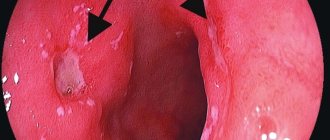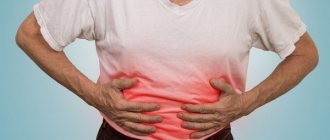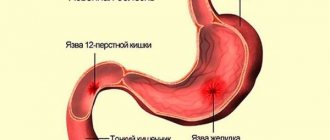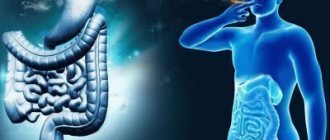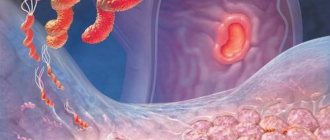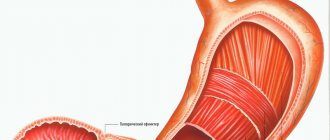How does smoking affect the stomach?
The negative effects of smoking on the gastrointestinal tract begin in the mouth.
After all, in order to fully grind and chew food, you need healthy teeth and gums, and for any smoker, after 3-5 years of “experience”, the teeth not only turn yellow, but also begin to decay. Food that is poorly chewed and not sufficiently moistened with saliva ends up in the stomach, where it also cannot be properly digested. Each smoked cigarette “hits” the stomach in several directions at once.
https://www.youtube.com/watch?v=qttLjg3CSDg
Firstly, due to smoking, the normal humoral and nervous regulation of the stomach and intestines is disrupted; the smoker may stop feeling hungry or, conversely, feel a “brutal” appetite after each cigarette. As a result, gastric juice, bile and other substances necessary for digestion are produced not when food enters the stomach, but independently of this process.
Secondly, each cigarette causes a spasm of the smooth muscles of the stomach and disrupts the normal movement of the intestines, which is why food stagnates in the upper and lower parts of the digestive tract and the body does not receive enough nutrients and vitamins.
Well, thirdly, like other organs, the gastrointestinal tract experiences oxygen starvation and lack of nutrients due to spasm of blood vessels and impaired blood oxygen saturation. Let’s look at how all this works and what it can lead to collectively below.
Tobacco smoke entering the oral cavity begins to irritate the salivary glands, increasing the secretion of saliva. Together with it, nicotine and other substances enter the stomach, where they cause irritation of its mucous membranes, destroying the protective layer and making them more vulnerable to hydrochloric acid. But most of the nicotine from tobacco smoke enters directly into the blood, penetrating the brain and affecting the hypothalamic region, where the centers responsible for the feeling of hunger and satiety are located.
A disruption in the connection between the hypothalamus - nerve endings - the stomach leads to the fact that the digestive organs do not secrete enough juices during the digestion of food or begin their increased production when it is not at all necessary. And even this is not the end of the negative effects of nicotine! Now it acts on the stomach indirectly - through the blood.
The release of adrenaline that occurs after each puff causes the blood vessels to constrict and the stomach to tense all its muscles and sphincters. Under such conditions, normal digestion of food is out of the question. Imagine what will happen to the stomach if this happens every day, 10-20 times a day?
When talking about the dangers of smoking, most of us mean the harmful properties of nicotine, but there are about 3,999 more compounds in tobacco smoke and only a minority of them are inert. Most of these substances enter the lungs, but a small dose of compounds such as acetaldehyde, acetone, ammonia, hydrogen sulfide, ethylamine, formaldehyde, methyl alcohol, polonium and arsenic is enough to cause irritation and then inflammation of the gastric mucosa.
The walls of this organ are covered with a special film and mucus, which helps protect them from the corrosive effects of hydrochloric acid. But due to tobacco smoke, this protective coating becomes thinner, less mucus is secreted, and areas of irritation, inflammation, and then ulcers appear on the walls of the stomach.
Briefly about passive smoking
Passive smoking is the involuntary inhalation of cigarette smoke by a non-smoker.
This process does not cause much less harm to the body than active smoking. A person can get up to 60% of tobacco chemical compounds simply by being near a smoker. Resins, aldehydes, carbon monoxide - all of this has a damaging effect on the stomach.
With passive smoking, gastritis develops more slowly and ulceration rarely occurs, since one of the ways toxins enter the stomach is absent - ingestion with saliva. However, the carcinogenic substances absorbed into the blood are enough to significantly increase the likelihood of stomach cancer from passive smoking.
The effect of tobacco smoke on the digestive system
Smoking has detrimental effects on digestion and digestion of food. Nicotine, which enters the gastrointestinal tract, through salivation provokes a large secretion of the pancreas and rapid digestion of the contents of the stomach. There are several ways in which nicotinic acid and ammonia vapors affect the digestive organs.
- The effect of smoking on the digestive organs through the salivary glands occurs after inhaling cigarette smoke. Together with saliva, part of the tobacco fumes and nicotine secretions enter the mucous membrane of the digestive system and tightly envelop the walls of the gastrointestinal tract.
- Smoking a cigarette sends a signal to the nerve endings of the brain and dulls the appetite. The part of the brain responsible for satiating the body gives a signal to the digestive organs, after which the person does not feel hungry.
- Nicotinic acid can affect internal secretion through the blood, reducing blood flow to internal organs.
Nicotinic acid disrupts the secretory function of the stomach, the secretion of hydrochloric acid and pepsin, which provokes the formation of erosions and ulcers.
Nicotine in tobacco smoke causes severe irritation of the salivary glands, which in response begin to produce large amounts of saliva. Not all smokers have the opportunity to constantly spit out excess nicotine; most swallow saliva with nicotine, which not only causes stomach irritation, but can also cause infection of the digestive organs.
After entering the blood, nicotine begins to actively interact with the central nervous system. It affects the hypothalamic region, where the centers of appetite and satiety are located, as a result of which some smokers stop eating regularly, while others, on the contrary, constantly feel hungry.
In addition, nicotine also negatively affects the autonomic nervous system, which provides the motor, secretory and absorption functions of the stomach and intestines. As a result of this, all digestive processes in smokers are disrupted: food stagnates in the stomach and intestines due to deterioration of motility, and the lack of digestive juices interferes with its normal digestion and absorption.
Tobacco smoke, the temperature of which is approximately 50-60 degrees, gets into the oral cavity and burns it. Temperature changes destroy the protective shell of teeth, causing them to darken and form cavities. Nicotine, tar, ammonia, acids and other components of tobacco smoke irritate the tongue, pharynx and esophagus of the smoker.
Increased salivation and disruption of the innervation of the digestive system often causes the development of gastritis, stomach ulcers, or exacerbation of existing diseases. Bad breath, pain and heaviness in the epigastric area, nausea and vomiting after eating - this is not a complete list of all the complaints of a smoker with an experience of 10 years or more.
Hookahs and gastritis
The second popular analogue of regular cigarettes is hookahs. In every city there are many bars offering to "smoke". This type of service is especially popular among young people. Many hookah lovers believe that their hobby is not as harmful as regular cigarettes.
But the effect of hookah on the body, especially on the gastrointestinal tract, is completely unsafe . If you smoke a hookah while having gastritis, the condition will worsen , this leads to:
- irritation of the gastric mucosa,
- increased secretion of hydrochloric acid,
- constriction of blood vessels under the influence of nicotine.
Possible effects on digestion
https://www.youtube.com/watch?v=IEThCu8ymd8
Poor chewing of food, suppressed or increased secretion of gastric juice, impaired intestinal motility causes “hunger” pain, nausea, heartburn, bloating and spasms in the intestines, as well as problems with appetite and stool. Moreover, often all this is at the same time. An experienced gastroenterologist can find out the smoking history without even asking about it - simply based on the patient’s complaints.
A little later - after 6-7 years of smoking, the endocrine glands begin to work much worse, less gastric juice is produced, and the gastric mucosa gradually atrophies. At this stage, sharp pains may stop bothering the patient; now his constant “companions” will be nausea, heaviness in the stomach, poor appetite and chronic constipation.
Many smokers who have been diagnosed with “gastritis” or a stomach ulcer and have not stopped smoking are happy, thinking that if their pain has stopped, then the disease has stopped or has stopped its development. But in fact, the disappearance of the clinical symptoms of the disease only indicates that the process has gone deeper and it will be much more difficult to cure it.
Unfortunately, it is only possible to completely eliminate the harmful effects of cigarettes and nicotine on the stomach if the smoker’s experience does not exceed a couple of years; after this, changes in the mucous membrane of the digestive organs can become irreversible.
But the sooner you quit smoking, the greater the chance that safe gastritis will become your companion for life, and not a perforated stomach ulcer or gastrointestinal cancer.
DO YOU WANT TO QUIT SMOKING?
Then you need a strategy for quitting cigarettes. With its help it will be much easier to quit.
It is enough to smoke 1 cigarette and for 15-20 minutes the stomach stops contracting, and food digestion slows down several times. Under the influence of smoking, the secretion of hydrochloric acid, enzymes, pepsin and other components of gastric juice and bile decreases.
Moreover, this happens only after 5-6 years of active smoking; before this, cigarettes, on the contrary, caused increased secretion of all of the above substances, which provoked the development of gastritis or gastric and duodenal ulcers.
As a result of this, many smokers with more than 10 years of experience suffer from decreased appetite, heaviness and pain in the stomach, bloating, cramps and flatulence.
And due to impaired digestion and absorption of food, they develop a deficiency of vitamins and nutrients, so that the “typical” smoker is a pale, emaciated person, with an eternally dissatisfied facial expression and a bilious character. What else could a person be like if he suffers from lack of appetite, stomach pain and intestinal upset?
And this is still the most favorable option; it is much worse for those cigarette lovers who already had diseases of the digestive system or a predisposition to cancer. Indeed, according to WHO, the risk of malignant tumors of the lips, oral cavity, esophagus and stomach in smokers is 4 times higher than in those who have not touched cigarettes.
You can only get rid of digestive problems with a cigarette, and the sooner you do this, the more chances you have for a healthy, active and “tasty” life!
Symptoms of the disease
The acute form of gastritis is characterized by sharp attacks of pain below the chest . It usually starts some time after eating (if you ate something spicy, fried, or fatty).
Associated symptoms are nausea and heartburn . After a certain period of time, the pain attacks stop. It is important to start treatment on time - this guarantees recovery.
But if you ignore the symptoms, put off going to the doctor and do not start treatment, acute gastritis becomes chronic . This form of the disease is characterized by periodic attacks of pain : it either passes or worsens. Pain can occur either immediately after eating or some time after eating.
Smokers are prone to illness with increased levels of acidity. The symptoms of chronic gastritis are not very active, and attacks mainly occur during overeating, alcohol abuse, in case of long breaks between meals, smoking, and also in stressful situations.
Oral cavity
Nicotine and ammonia acid pass through the oral cavity before entering the gastrointestinal tract. By inhaling tobacco smoke, we literally cauterize the salivary glands and saturate the entire oral cavity with nicotine resins, and then swallow the newly secreted oral secretion. Saliva with resins travels a long way before entering the esophagus, thereby leaving its harmful mark on the larynx and trachea. It remains on the organs for a long time.
Nicotine also causes many problems in the oral cavity:
- yellowing of teeth;
- bleeding gums;
- bad breath: this symptom also occurs from poor digestion and putrefactive processes in the stomach.
Swallowing saliva saturated with ammonia and nicotine vapors provokes intestinal dysbiosis.
Summary
Thus, it can be stated unequivocally that smoking negatively affects the gastrointestinal tract. Therefore, if you have gastritis, in order to prevent complications in the future, it is necessary to get rid of your addiction as early as possible.
If a patient with gastritis decides to give up a bad habit, the body will immediately respond with positive changes in all body systems. When toxic products are eliminated, the following normalization of processes in the stomach is observed:
- Heartburn disappears;
- Appetite increases;
- Unhealthy belching disappears;
- The mucous membrane of the organ is restored;
- The person's weight returns to normal.
To reduce the manifestation of possible withdrawal symptoms, individual medical consultation is necessary. As a rule, in order for recovery to occur faster, the patient’s body needs additional intake of vitamins E and C, as well as microelements - zinc and chromium, which are necessary for the production of biologically active substances in the body.
A little physiology
Few people know that nicotine is similar to acetylcholine (ACh), a substance that is a natural signal transmitter in the nervous system. Released from the endings of nerve cells in autonomic ganglia (such as the solar plexus), ACh transmits nerve impulses from the central regions (hypothalamus) to peripheral nerve fibers. Through these signals the activity of all organs of the human body is regulated:
- Heartbeat slows down.
- The activity of the stomach and the entire digestive system increases.
- Intestinal motility increases, which can cause stomach pain.
- The muscles of the bladder, etc., relax.
In general, a state occurs that is observed in a person at rest and during relaxation.
In addition, it is ACh that is the intermediary in the transmission of impulses from nerve fibers to the muscles of the body. ACh is also involved in all processes of thinking and regulation of biochemical reactions in the brain.
Nicotine, coming from outside, replaces ACh in all these processes. As a result of acquiring the habit of smoking cigarettes, the production of ACh decreases. And when a smoker takes too long a break or tries to quit smoking, he experiences difficulties with those body functions that are not consciously regulated (vegetative):
- Activity of the stomach.
- Bowel activity.
- Production of digestive juices, etc.
That is, a long-term smoker notes that without smoking cigarettes, he develops problems with the intestines and digestive system: he cannot go to the toilet in the morning, cannot have a normal breakfast, his stomach may begin to ache, etc. Those who quit notice the same symptoms bad habit of a heavy smoker.
However, it is not only quitting smoking that leads to such consequences. And it’s not just those who quit smoking who have stomach pain. Over time, when quitting cigarettes, the production of ACh is restored, followed by the lost functions. But those who continue to smoke will experience even more unpleasant effects of smoking on the stomach and intestines.
Exacerbation after quitting the habit
Complaints like “I quit smoking, but gastritis worsened” are rather an exception to the rule. Usually a person immediately feels significant relief, and if he follows proper nutrition, he can even go into long-term remission from gastritis, forgetting about its exacerbations. And yet, some smokers experience symptoms of the disease immediately after quitting the bad habit.
The reasons may be:
- Masking various stomach problems by extinguishing some of the pain with nicotine. That is, the problem existed before, but the smoker simply did not pay attention to it.
- Gastritis is triggered by stress experienced by the body, and also by the person himself. The disease in this case develops in a similar way to how it happens with stress for another reason.
- Vascular tone has changed. If the regular intake of nicotine kept the vessels in a state of spasm, then later they sharply and suddenly expanded, which provoked an exacerbation of the disease.
- Withdrawal syndrome is observed. As a result of this syndrome, the amount of gastric juice increases, as does the production of saliva, and all this causes the development of the acute phase of gastritis.
- The rhythm of nutrition is disrupted. After quitting smoking, a person can “eat up” unpleasant sensations, practice snacking, poor nutrition, consume chips, crackers, drink a lot of tea and coffee. All this leads to acute gastritis.
Intestines and stomach
In smokers, the gastrointestinal tract poorly performs its main functions: digesting food and extracting vitamins from it. The reason for this is poor movement of food due to poor blood flow. If the food that enters the stomach does not have time to be processed, then less vitamins are released from it than usual, which leads to depression of the entire body.
Stagnation in the intestines leads to constipation or rapid bowel movements, which is why many smokers notice the presence of diarrhea after smoking a cigarette. Due to problems with digestion and the inability to empty the stomach for a long time, a person smokes in anticipation of the smoking effect of emptying, without even realizing that this only aggravates the problems affecting the digestive system.
How do other smoking mixtures affect the disease?
The modern industry has learned to produce cigarette substitutes, which, according to their manufacturers, are practically harmless. These include electronic cigarettes and hookah.
When using various electronic types of smoking mixtures, the effect on the stomach is slightly reduced. This is due to the fact that they only release nicotine, which still has a fairly strong negative effect.
Some manufacturers, trying to reduce the harm caused to the stomach, use alcohol or capsaicin instead of nicotine fillers. However, when they evaporate, other harmful substances enter the body, which also have a negative effect on gastritis, just like nicotine.
Ways to solve the problem
All these compounds have an irritating effect on the mucous membranes of the mouth, respiratory tract and intestines. That's why many people have a stomach ache after smoking. As a result of irritation, the glands located in the stomach begin to intensively produce gastric juice in the absence of food in it. The effect of nicotine on the hypothalamus is accompanied by a decrease in appetite. But the effect on ACh receptors sensitive to it stimulates the production of gastric juice.
Cigarette tars contained in tobacco are toxic.
The negative effect of irritants and nicotine on the stomach leads to chronic inflammation of its mucous membrane and natural disorders of the digestive system. As a result, your stomach may hurt. First, the vast majority of smokers develop gastritis with high acidity.
However, the saddest consequence of the effect of nicotine on the digestive system is the degeneration of the altered mucous membrane and the development of stomach cancer, which, according to WHO statistics, affects smokers 4 times more often than non-smokers. Moreover, it is not at all necessary that your stomach will hurt. Usually such rebirth occurs unnoticed.
Smoking and improving digestion are incompatible things. If you have been diagnosed with gastritis, colitis or other gastrointestinal diseases, then during treatment you will still have to give up your addiction. Ideally, quit smoking completely.
Treatment is prescribed individually by a gastroenterologist or therapist. In some cases, surgery may even be necessary. In order to prevent digestive diseases from smoking, the following actions should be taken.
- Rejection of bad habits. Not only smoking provokes enterocolitis. Together with caffeine or alcohol, the harm from each cigarette smoked increases a hundred times.
- Play sports. Meditation and morning jogging will help distract attention from a bad habit and strengthen the entire body.
- Make it a habit to eat right and have breakfast in the morning. A morning breakfast with light food will avoid problems with exacerbation of gastritis and peptic ulcers.
- Eliminate fermented products from your diet - these are bakery and confectionery products, they provoke fermentation in the stomach and heartburn.
Tobacco smoke contains about 3 thousand chemicals, of which about 200 are considered harmful. Nicotine, aldehydes, tars, and heavy metals have a negative effect on the stomach.
Their toxic effect is realized in two ways: a direct effect on the gastric mucosa when swallowing saliva containing the listed components, as well as an indirect effect after the compounds are absorbed into the blood. Toxins are distributed throughout the body through the bloodstream, causing their effects on the heart, blood vessels, brain, and digestive tract.
The main mechanisms of the negative effects of smoking on the stomach include:
- vasoconstrictor effect of nicotine, disturbance of nutrition of the stomach wall;
- destruction of the mucous membrane by aldehydes contained in the filter;
- decreased tone of the esophageal sphincter, development of reflux esophagitis;
- slower emptying of the esophagus and stomach, food stagnation;
- decreased saliva production, decreased ability of the esophagus to cleanse itself;
- increased secretion of hydrochloric acid.
https://www.youtube.com/watch?v=OCQZQyrXd-M
The combined influence of these factors causes an inflammatory reaction in the mucous membrane. With a long history of smoking, superficial inflammation develops into erosive gastritis, and then into peptic ulcer.
If at first gastritis is hyperacid in nature, then over time the secretory ability of parietal cells is depleted, and the acidity of gastric juice decreases. After decades of smoking, the gastric mucosa undergoes atrophic changes and the risk of cancer increases.
Digestive disorders are aggravated by impaired liver function, since most of the toxins are disinfected there and the load on the organ increases significantly.
Smoking for gastritis
Smoking is a type of domestic drug addiction, the most common form of which is nicotineism - smoking tobacco. It is safe to say that smoking with gastritis is dangerous. Components of cigarette smoke lead to exacerbation of gastritis. When you inhale cigarette smoke, nicotine enters the oral cavity, which is quickly absorbed into the blood. This leads to disruption of the functioning of all these organs. In a patient with gastritis, this process can cause many complications.
It's safe to say that smoking is dangerous if you have gastritis.
Smoking increases the level of hydrochloric acid. It is necessary for the digestive system, but when the acid exceeds the norm, the consequences can be very unpleasant. This is especially dangerous for those who live with high stomach acidity. Smoking with gastritis can worsen the form of gastritis and transform it into atrophic gastritis. This is very dangerous because this condition is considered precancerous.
How does smoking affect gastritis?
Tobacco smoke contains more than 4,000 different substances, of which over 200 are dangerous to the human body. Among them, nicotine, tobacco tar, carbon monoxide (carbon monoxide), arsenic, formaldehyde, hydrocyanic acid, etc. are especially harmful. Tobacco smoke also contains radioactive substances and heavy metals. More than 40 chemical compounds contained in it can cause cancer. The most dangerous in this regard are benzopyrene and the radioactive isotope polonium-210.
Smoking affects not only the secretion of hydrochloric acid and the contractile activity of the stomach, but also changes the composition of the cells of the gastric mucosa. As a result, even with relatively short periods of smoking, gastritis with high acidity occurs, and with long-term smoking, chronic gastritis with secretory insufficiency occurs. The influence of tobacco smoking on the course of gastric and duodenal ulcers has been proven.
Although smoking is not the direct cause of ulcer formation, it can contribute to the development of ulcers and worsen the course of the disease. It was found that gastric and duodenal ulcers occur 2-3 times more often in smokers than in non-smokers, and the mortality rate from peptic ulcers and its complications in smokers is 4 times higher.
Smoking contributes to the occurrence of such serious complications of peptic ulcer disease as bleeding and perforation of the ulcer, and the frequency of complications depends on the length of smoking and the number of cigarettes smoked. Smoking makes it difficult for the ulcer to heal during treatment.
Recommendations for those who want to quit smoking if they have gastritis:
- do not smoke on an empty stomach;
- give up smoking at night;
- refrain from drinks such as coffee and strong black tea;
- remove fatty, salty, smoked and spicy foods from your diet;
- do not smoke more than 10 cigarettes per day;
- give up cigarettes during an exacerbation of the disease;
- gradually reduce the number of cigarettes smoked;
- After eating, take half-hour breaks before lighting up.
Similar consequences await those who try to replace a traditional cigarette with a hookah or an electronic cigarette. Even if the mucous membrane is not subject to irritation, nicotine is a toxic substance that negatively affects human health.
Symptoms
Stomach pain and smoking can be linked by the following symptoms:
- severe nausea in the morning and when eating a small amount of food;
- pain in the epigastric region, colic in the right hypochondrium - this may indicate a problem with the pancreas;
- pain in the hypochondrium, spreading to the back and lumbar region, requires immediate intervention by a gastroenterologist, these are symptoms of developing pancreatitis;
- severe heartburn;
- bitter taste in the mouth;
- Smoking affects digestion, causing loss of appetite and severe weight loss.
The intestines do not produce hydrochloric acid well, as a result of which a person feels heaviness and sharp pain in the stomach. In addition, a person may suffer from constipation or diarrhea, which are chaotic and paroxysmal in nature, that is, they can occur suddenly, even from a small piece of food.
Diagnostics
Diagnosis of gastritis in smokers is carried out according to the standard scheme, but it also has some peculiarities. It is important to pay attention to the clinical picture of the disease. The following symptoms are characteristic of gastritis, which developed due to smoking:
- heartburn, burning sensation in the chest, worse after smoking a cigarette;
- pain in the upper abdomen;
- bowel dysfunction;
- nausea and vomiting, which are sometimes observed immediately after smoking;
- unpleasant taste in the mouth;
- belching;
- lack of appetite.
To establish the connection between smoking and gastritis, an indicator such as the pack-year index (PYI) is determined. If the IPI is more than 10, this is a marker of a high risk of complications from the lungs, cardiovascular and digestive systems.
It is necessary to conduct an FGDS (fibrogastroduodenoscopy) with pH-metry. According to FGDS, smokers are 3 times more likely to have esophageal reflux and 5.5 times more likely to have duodeno-gastric reflux. Hemorrhagic and erosive gastritis and an ulcerative process are often detected. With prolonged smoking - atrophy. pH in the early stages of the disease is reduced, in later stages it is usually increased. You will learn more about the endoscopic picture of the stomach in smoking patients from the video:
Intestinal consequences
The habit of smoking cigarettes is accompanied by an irregular supply of nicotine, which stimulates ACh receptors, which leads to impaired intestinal motility. The consequence is a disruption of the entire process of digestion and absorption of nutrients and vitamins. Constipation is replaced by frequent stools, the composition and concentration of digestive juices in the stomach and intestines changes.
Thus, smoking is not just a bad habit. This is a drug addiction, which additionally leads to extremely negative consequences of smoking on the digestive system: from inflammation to cancer of the gastrointestinal tract. Therefore, everyone who smokes needs to think about whether it is so important to maintain this harmful behavior or whether it is still worth making an effort and giving up cigarettes.
As you know, smoking harms the entire body and causes addiction. Getting rid of a bad habit is very difficult. The harmful effects mainly occur not only on the respiratory tract, but also on the stomach and intestines. Many consider such statements to be fiction and naively believe that smoking has nothing to do with the esophagus.
Can people with gastritis smoke?
From the above, it is obvious that smoking is contraindicated for gastritis. In order to never encounter inflammation of the gastric mucosa or to promptly put the pathology into remission, minimizing the risk of complications, you need to completely abandon the harmful addiction. For addicts who have been addicted to this habit for many years, this can become incredibly difficult, but experts say that quitting nicotine will take about 30 days, after which the craving for the bad habit will decrease on its own .
How to quit smoking?
Smoking is primarily a psychological disease. If you want to quit smoking, you need to enlist the support of loved ones with whom you spend a lot of time. Relatives and friends will always be nearby and help you quit such a bad habit as smoking. In this situation, the main thing is support.
Some people who want to suddenly quit smoking are worried that contraindications may arise in the future. But what can happen to a person who has stopped breathing smoke? Gain strength and patience and say goodbye to this bad habit forever. The only thing you may experience after quitting cigarettes or hookah is irritability. Everything can be fixed if you find some new hobby for the soul and completely take your mind off cigarettes. In just a month, this feeling will leave you, and you will again become a free and healthy person.
How to reduce the harm of smoking
It is quite obvious that it is necessary to quit smoking if you have gastritis of the stomach. However, in practice, only 5-10% of people can do this. The rest will not be able to give up the addiction. Such people should adhere to the following recommendations that will reduce harm to the body:
- Do not smoke on an empty stomach. Therefore, before you smoke a cigarette, you need to eat something.
- Give up the habit of smoking with liquids (coffee, tea), as this accelerates the entry of harmful substances into the gastrointestinal tract.
- Don't smoke under stress.
- Try to reduce the number of cigarettes you smoke.
- Wait a while after eating and only then light a cigarette.
When gastritis worsens, it is important to understand that smoking will seriously aggravate the course of the disease. Symptoms of gastritis such as dizziness, a lump in the throat, or gastritis from smoking may occur. Try to lead a healthy lifestyle and avoid bad habits that are harmful to your health.
Smoking and gastritis are incompatible things, since the harmful substances that enter the body with this habit significantly complicate the course of the disease and also increase the healing period. Therefore, it is best to completely get rid of cigarette addiction. But this must be done gradually so as not to harm yourself.
Research results
Only through numbers can a smoker be proven how harmful his habit is. For example, over the past 10 years in our country alone, about 50 thousand men and women have died from smoking. These are those people who, at a certain stage in their lives, simply did not have enough willpower to quit smoking. That’s why it’s stupid to believe that smoking has no effect on existing diseases in your body, be it gastritis or any other disease.
The smoker is confident that he is not doing anything wrong, reassuring himself that his body is in normal condition. If something starts to hurt, then the cause could be anything, but not cigarettes.
In addition, smoking can completely displace the pleasure hormone (endorphin) from your life. It plays an important role for every person. If you don't enjoy life, is that okay? You need to clearly set priorities and understand what is important to you, and you need to protect yourself from such minor things as smoking. In addition, we should not forget that a person who smokes surrounded by close people primarily harms the non-smoker, since he involuntarily inhales smoke and thereby risks developing serious illnesses.
The poison that is released when smoking cigarettes travels from the lungs to the brain in literally 10 seconds. It also has a negative impact on the functioning of all internal organs. As for addiction, according to statistics, a person takes longer to get used to tobacco than to cocaine or heroin. Only after 6 months of regular smoking can you be sure that a person has become addicted. Of course, everyone has the right to choose for themselves whether to continue smoking or to quit. If you want to quit smoking, but cannot do it on your own, it is better to consult a specialist.
What does a hookah consist of?
The design of a hookah is not as complicated as it might seem. The upper part is a cup for tobacco (kilim). Tobacco and coal are placed there, separated by foil. There are two types of coal - charcoal and tableted. The only difference between them is the speed of ignition (charcoal in the form of tablets ignites instantly, while wood charcoal takes longer to smolder). The material used for such a cup is different: it can be clay, metal or ceramic. In a ceramic cup, tobacco does not burn as much and therefore emits less harmful smoke.
After the cup there is a seal. It creates a tightness in the places where the components of the hookah are connected.
A saucer is a special plate designed to prevent ash from scattering; coal tweezers are often placed on it.
Mine. Externally, it is a hollow tube, inside which the smoke cools and foreign impurities settle along the walls.
The lowest part of the hookah is a glass or metal flask filled with water or other liquids (milk, wine). The liquid is needed to cool, moisturize and purify the smoke passing through it. The shaft is connected to the flask using seals and a valve. This is where the hose comes off. It is rubberized inside and covered with decorative materials on top - it can be fabric or leather of various shades. A wooden or plastic mouthpiece is attached to the end of the hose.
Hookah smoking rules
- Combine with fruits (peaches, bananas and apricots).
- Combine with green tea or hibiscus tea.
- Hookah is smoked only on a full stomach. Smoking accelerates the production of gastric juice, which has a negative effect on the gastric mucosa.
- Combine hookah with alcoholic drinks. This combination can cause a condition similar to alcohol poisoning. Red wine is not recommended for use as a filler in a hookah flask. Do not drink alcohol from the flask after use! It accumulates harmful substances that are released during smoke purification.
- You should not put pure cigar tobacco in a hookah, which can cause a burn to the throat mucosa.
- One mouthpiece cannot be used for two or more people - this is a disposable device and serves only one owner. Otherwise, this turns into non-compliance with personal hygiene rules, which can lead to infection with various infectious diseases.
- According to the rules of Eastern culture, it is considered bad manners to light cigarettes from a hookah.
- You cannot place the hookah on the table, it is impolite to pass the mouthpiece from hand to hand - it must certainly be placed on the floor.
Is there any harm from hookah?
Smoking a hookah is considered potentially safer than smoking cigarettes. Unfortunately, the latest scientific data refutes this. A recent study published in the journal Respirology found that hookah smoking has the same effect on lung function and respiratory symptoms (chest tightness, coughing and wheezing) as pipe smokers, which scientists believe is similar to smoking. cigarettes, it is associated with an increased risk of cardiovascular disease, lung and larynx cancer.
"Beneficial" benefits of hookah smoking"
Myth No. 1
The peculiarity of the hookah is that the smoke, passing through water or other liquid in the flask, is filtered and moistened. This means that it does not contain substances that are so dangerous to our lungs: acrolein, aldehydes. The amount of tar entering and settling in the lungs is reduced - and the amount of nicotine is reduced by 90%.
Smoking tobacco through water does not filter out carcinogenic chemicals. Nicotine still passes through all barriers and enters our body, and the consequences of this have long been known.
Myth No. 2
When you inhale cooled hookah smoke, you do not burn your lungs, so this activity is not so harmful to your health.
Yes it is. But there is no benefit here. Even though the smoke is cooled, it still contains carcinogens and is still harmful.
Myth No. 3
Smoking a hookah will not make you addicted, unlike cigarettes. Because there is no nicotine.
Like regular tobacco, hookah contains nicotine. And in an hour of imposing smoking on pillows, you inhale 100-200 times more of it than if you smoked one cigarette.
Tips and tricks
The main advice for all smokers is to quit the bad habit. After stopping smoking, first of all, heartburn and epigastric pain decrease, and stool normalizes. Nausea and loss of appetite persist somewhat longer. If the inflammatory process was initially deep and the mucous membrane had time to atrophy, then a complete recovery cannot be expected.
If you still can’t quit smoking, you should at least try to follow the recommendations to mitigate the consequences of smoking:
- Do not smoke on an empty stomach or before bed.
- Try to smoke no more than 10 cigarettes per day.
- Do not smoke while drinking tea, coffee, or alcoholic beverages.
- Forget about smoking or vaping in your apartment.
- After smoking a cigarette, try to rinse your mouth with water.
- When smoking a hookah in a group, thoroughly disinfect the nozzle or use an individual one.
Treatment of gastritis in smokers is carried out according to general rules: depending on the symptoms, secretion blockers, antacids, antispasmodics, and prokinetics are prescribed. When Helicobacter pylori infection is detected, the pathogen is eradicated. However, it must be taken into account that even if all recommendations are followed, smoking slows down the regeneration processes of the mucous membrane and makes therapy less effective.
The cause of gastritis is considered to be the bacterium Helicobacter pylori. Helicobacter can be present quietly in the human body without causing disease. The bacterium becomes active when conditions are favorable. For example, with a weakened immune system and irritating substances entering the stomach. What inevitably happens when smoking. Smokers often suffer from bronchitis and emphysema, which provoke hypoxia of the gastric mucosa. The tissue changes, Helicobacter begins to actively multiply, causing gastritis.
Patients suffering from diseases of the gastrointestinal tract must know information about the ban on smoking for gastritis. The article is useful to all adherents of a bad habit.
Many heavy smokers think that perhaps nicotine only negatively affects the lungs, and the stomach does not experience any negative effects. But smoking is extremely dangerous for the whole person. The esophagus and stomach suffer greatly from this bad habit. There is a clear connection between smoking and gastritis.
Increasingly, doctors are concerned about the increase in gastritis among the population. According to the latest information, every second adult and every third child suffers from gastritis. The risk group is smokers, active and passive, who are forced to inhale tobacco smoke.
Smoking deprives the body of vitamin C and group B. Substances are essential for the normal functioning of the gastric mucosa. Gastritis is an inflammation of the membrane, causes disturbances in cell division and changes the process of hydrochloric acid production in the stomach. It is obvious that smoking has a negative effect on the stomach. Moreover, gastritis requires careful treatment of the digestive organs.
If gastritis worsens or develops into a chronic form, smoking is often to blame. If a person cultivates the habit of smoking on an empty stomach, there is a high chance of developing a stomach or duodenal ulcer.
Why is hookah harmful?
According to experts, smoking a hookah for gastritis can aggravate an already not very pleasant situation. As a result you will get:
- Damage to the gastric mucosa.
- Progressive development of existing defects.
It should be remembered that when nicotine or hookah smoke enters the human body, the stomach immediately begins to release a large amount of secretion. The secretion is a harmful substance containing hydrochloric acid. It has a negative effect on the human mucosa.
That is, if you are treating gastritis, smoking during the recovery period is strictly prohibited, otherwise you will not be able to fully recover, even if you adhere to a strict diet.
You need to understand that smoke is harmful to your health, regardless of whether it enters the body through a cigarette filter or a hookah pipe.


